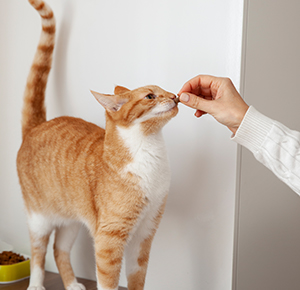Pet Care Guide
A place to find all the knowledge about pet feeding: Everything you need to know for better pet feeding, Learn how to feed your pet the right way, Find helpful tips for your pet'’s happy, healthy life.



SPECIAL DIET
Hydration Support Bone & Muscle Multivitamin Support Dental Health Joint & Urinary Health Digestive Health Skin & Coat For Sterilized Pets
What's Best for Your Pet?
Answer a few questions to find the right food for your pet.
Get Food Suggestions
SPECIAL DIET
Hydration Support Bone & Muscle Multivitamin Support Dental Health Joint & Urinary Health Digestive Health Skin & Coat For Sterilized Pets
What's Best for Your Pet?
Answer a few questions to find the right food for your pet.
Get Food Suggestions

Pet Care Guide
A place to find all the knowledge about pet feeding: Everything you need to know for better pet feeding, Learn how to feed your pet the right way, Find helpful tips for your pet'’s happy, healthy life.

About Wanpy
At Wanpy, we create every product with the utmost care and highest standards because we understand what truly matters for your pet’s well-being.
We’re here to help you provide the nutrition your pet needs for a healthy and happy life.




You’ve brought home a tiny kitten full of energy and curiosity. But when you place a fresh bowl of food in front of them, your kitten refuses to eat it. No interest in the food, just a little nose twitch or a turn away from the bowl.
You start to worry: Why isn't my kitten eating? Are they ok? Are they not happy here?
As any cat parent knows, a kitten refusing food isn’t just frustrating. It can be heartbreaking. You want to give them the best start in life, and not eating feels like a sign that something is off. The truth is, a kitten refusing food is more common than you might think, especially during their first few days at home. What matters is understanding why it’s happening and how you can gently help your kitten regain their appetite.
Here are some of the most common reasons behind a kitten’s loss of appetite:
1. Stress and Adjustment to a New Environment
Moving into a new home is a big change for a kitten. New sights, sounds, and smells can feel overwhelming. On top of that, they are adjusting to unfamiliar people, routines, and spaces. All of this sensory input can make even the most playful kitten feel anxious and lose interest in food.
A stressed kitten may hide more, sleep more, or just seem unsure. This emotional shift can lead to a temporary lack of appetite as they gradually begin to feel safe. Creating a quiet, cozy area just for them and keeping their environment calm can really help them settle in.
2. Sudden Food Changes or Unfamiliar Diet
Kittens can be picky, especially when introduced to a new food too quickly. If the food smells different or has a texture they’re not used to, they may reject it completely. Their small digestive systems also need time to adapt to any dietary changes.
Gradually mixing the new food with the old over the course of a week or so can help them get used to it. Choose nutrient-rich, kitten-formulated food that meets their specific needs. Sometimes, simply warming the food a little or adding kitten-safe broth can make it more appealing. [Insert Wanpy’s food for the kitten]
3. Teething and Oral Discomfort
Kittens go through a teething stage between about three to six months of age. This can make chewing hard or dry food uncomfortable. If eating feels painful, they might avoid food even if they are hungry.
During this time, offering softer meals can make a big difference. Wet food, or dry food soaked in warm water, can be easier for them to manage. Soft treats made for kittens can also encourage eating without causing discomfort.
4. Underlying Medical Issues
A loss of appetite can sometimes point to a health issue. Infections, parasites, or digestive problems may cause your kitten to stop eating. If you notice other symptoms like low energy, vomiting, diarrhoea, sneezing, or nasal discharge, it is important to take them seriously.
If your kitten hasn’t eaten for more than 24 hours or shows any signs of illness, contact your veterinarian as soon as possible. Kittens can become weak quickly without proper nourishment and care.
5. Litter Box and Feeding Area
Where your kitten eats can also affect their appetite. If their food bowl is too close to the litter box, or if the area is loud or busy, they might feel too stressed to eat. Kittens prefer a clean and quiet environment when they eat.
Kittens are sensitive to their surroundings. Make sure their feeding area is calm and separate from where they go to the bathroom. This simple change can help them feel more relaxed during mealtime.
6. When to Seek Veterinary Help
Kittens need consistent nutrition to grow strong and stay healthy. If your kitten refuses to eat for more than 24 hours or is showing signs of illness alongside their lack of appetite, it’s time to get professional help. Early intervention is crucial for their well-being, especially for very young or newly adopted kittens.
A kitten’s appetite can tell you a lot about how they’re feeling, physically and emotionally. Whether they are adjusting to a new home, experiencing teething, reacting to a food change, or feeling unwell, there is always a reason behind the behavior. Understanding what is going on helps you respond in a way that supports their health and happiness.
Patience, consistency, and observation go a long way in building good eating habits. Sometimes all it takes is a soft voice, a peaceful space, or a warm meal to help them feel safe enough to eat again. And if needed, gentle and tasty treats can help encourage even the most hesitant little eater. [Insert Wanpy’s treats for the kitten]
Subscribe to us and get the latest nursing knowledge